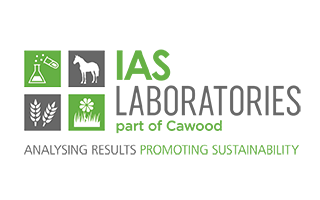Legen-dairy analysis
March 2023

Water is one of the most valuable commodities on the modern farm. Not only is a supply of clean, potable water necessary to keep livestock healthy for optimal performance, but dairy farmers must also ensure high quality water is used to wash and preserve the equipment used in production.
Read on to find out why livestock farmers need to ensure good water quality in their milking parlours, how water quality affects milking machines, how to maintain this water quality, and how IAS can help with expert water analysis services.
Why do I need to ensure good water quality in my milking parlour?
Improper handling of raw milk is responsible for nearly three times more hospitalisations than any other foodborne disease. Microbiologically contaminated water can cause elevated total bacteria counts (TBCs) and thermoduric bacteria (organisms that can survive pasteurisation) in milk.
Pasteurisation is usually effective in removing these pathogens. However, recent studies of multiple dairy farms found that water that is highly contaminated before pasteurisation is likely to remain contaminated afterwards. This not only puts the general public at risk, but the cows themselves, adversely affecting animal health and welfare. This also potentially results in reduced milk yield and profit for the farmer.
Preserving good water quality is also necessary for compliance. Dairy farmers who source their water from private wells are required to test the water used for both human consumption and for cleaning equipment that is involved in food production. These include milking machines and bulk tanks.
Private well water should be tested annually for bacteria to satisfy your Bord Bia SDAS audit. We can help you comply. Contact us to book in your water analysis now.

How does water quality affect milking machines?
As milking machines are some of the only pieces of equipment that are used 365 days of the year, ensuring smooth operation is paramount. Machine breakdown or malfunction can have a significant detrimental effect on a dairy farm, including delays, loss of profit, and inflated maintenance costs.
Water quality can have a substantial influence on the lifetime of certain components of milking machines and robots such as boilers. Water used to clean robot or milking machine exteriors can harm certain parts, even if they are made from stainless steel. Damage caused by unsuitable water may not be covered by a manufacturer, so it’s important to check your water quality to prevent voided warranty.
Water quality differs from area to area. It is therefore recommended that water used for cleaning the inside and outside of milking machines should be tested for a variety of parameters.
The below table illustrates the acceptable parameters of contaminants and other elements in the water you use in your milking parlour. However, please note that this is an indicator list only and is by no means exhaustive. Some milking machine and robot manufacturers will provide their own specifications for water quality, so please check with your supplier.

How do I maintain water quality in my milking equipment?
Traditionally, products such as sodium hypochlorite were used to disinfect milking equipment. However, due to the potential risk of chlorine residues, chlorine can no longer be used and extra care must now be taken when disinfecting your private water source. A UV disinfection system should instead be used. Irradiation with shortwave UV light destroys a variety of microbial pathogens, preserving food at low cost and low energy by reducing the risk of nutrient degradation and low food quality.
As an alternative, you can use peracetic acid in rinsing solutions to disinfect your milking machine and bulk tank at a rate of 2 fluid ounces per 10 gallons of water. Bear in mind that this is only a temporary solution, and that installing a UV lamp is strongly advised as a permanent fix. Your local plumber will be able to advise.
The most effective way to check the quality of your water is to undertake analysis services with an INAB accredited laboratory. This will help you maintain the quality of your water, safeguard animal and human health, and satisfy your Bord Bia SDAS audit.
IAS Laboratories has tested water quality for milking parlours for over 30 years. We also provide expert advice on any problems you may have. We tailor our analysis to suit your requirements, depending on the water source, the type of equipment, and the parameters required.
Contact us on [email protected] or 059 9721022 for more information.
